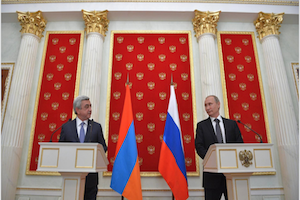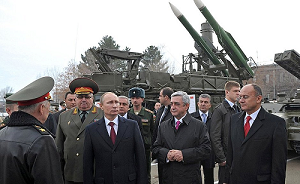Russian Loan Allows Armenia to Upgrade Military Capabilities
By Eduard Abrahamyan
January 8, 2018, the CACI Analyst
On December 6, 2017, the Armenian Parliament unanimously ratified the Armenian-Russian US$ 100 million “state export loan.” The accord, signed on October 24, allows Yerevan to borrow funds for purchasing a wide range of sophisticated arms manufactured by Russia in order to implement the “Common Defense Sector Development Plan.” This is Moscow’s second programmed military loan to Armenia, following the US$ 200 million loan agreed in 2015 which is now in the final stage of realization. The pending loan is intended to allow Yerevan to uphold its consistent procurement of military hardware since 2011 in an effort to negate Azerbaijan’s military-technical superiority.

The Kremlin’s Security Strategy in the South Caucasus: Implications for Baku
By Anar Valiyev
March 7, 2017, the CACI Analyst
On November 30, 2016, the defense ministries of Armenia and Russia signed an agreement to establish a joint Russian-Armenian Military Joint Task Force (MJTF). In June 2016, Armenia agreed to join Russia's regional air security system designed to protect Russia's southern borders and its allies. The treaty allowed Armenia to rely on Russia's anti-aircraft system and military satellites in order to defend its airspace. In late September 2016, it was revealed that Moscow had transferred the Iskander mobile short-range missile system to Armenia. These recent developments have raised serious concerns in Baku over Armenia's military buildup and its consequences for the Nagorno-Karabakh conflict.

Georgia’s prime minister visits Armenia
By Erik Davtyan
October 3rd, the CACI Analyst
On September 5, Georgia’s Prime Minister Giorgi Kvirikashvili, along with Vice Prime Minister and Minister of Energy Kakha Kaladze, and Deputy Minister of Foreign Affairs David Dondua, paid a one-day visit to Yerevan. Kvirikashvili has previously visited Armenia as Minister of Economy and Sustainable Development, however this was his first official visit after he became Prime Minister in December 2015. The visit came nearly a month before parliamentary elections in Georgia, which are set for October 8. Less than one week before, Kvirikashvili made a similar visit to Azerbaijan. During both visits, the Georgian delegation was composed of exactly the same level of representatives, although another deputy foreign minister was present in Azerbaijan – indicating the importance that Georgian authorities attach to demonstrating a balanced policy towards its two neighbor states.
Armenia and Georgia reinforce military cooperation
By Erik Davtyan
March 8th, the CACI Analyst
On February 1-2, Georgia’s Defense Minister Tinatin Khidasheli paid an official visit to Armenia. During a meeting with her Armenian counterpart Seyran Ohanyan, the two defense ministers discussed issues pertaining to Armenian-Georgian relations as well as global and regional security issues. The parties also signed a military cooperation plan for 2016, prioritizing exchanges of experience, military education, professional training, and strategic planning as the main objectives of this year’s agreement. It is noteworthy that Armenia and Georgia have signed military cooperation plans annually since 2010.
Is Washington re-engaging Baku?
By Stephen Blank
January 19th, 2016, The CACI Analyst
Throughout its tenure, the Obama Administration has minimized U.S. involvement with and engagement in both the Caucasus and Central Asia. However, a change in this policy may now be visible. Secretary of State John Kerry’s recent, and first, visit to Central Asia suggests a new interest in an expanded and hopefully regular mutual dialogue with the region. In the case of Azerbaijan, three high-ranking U.S. delegations have come through Baku in the last few months, clearly signifying renewed interest in dialogue and the subjects of their discussion, as revealed in the press, tend to corroborate that impression.






